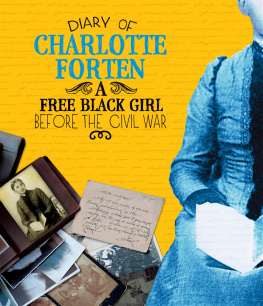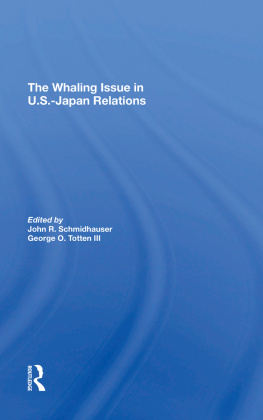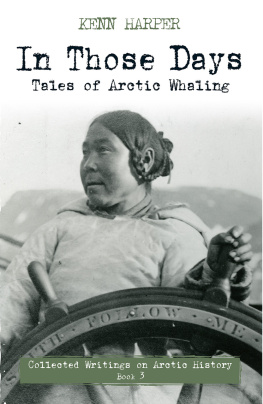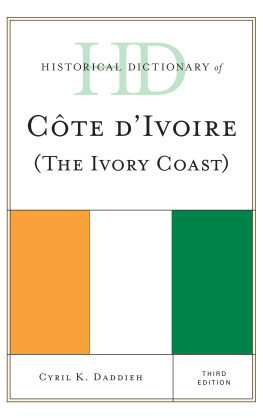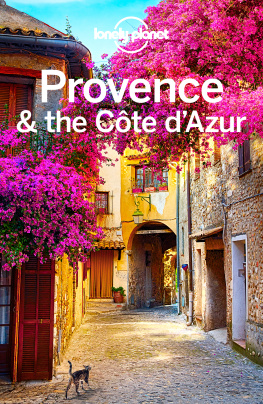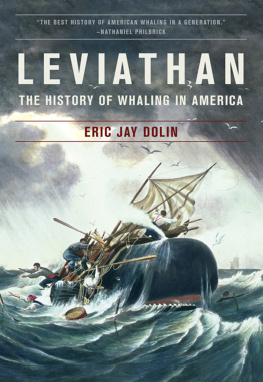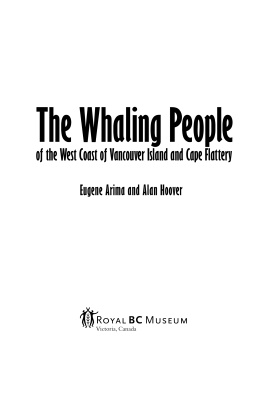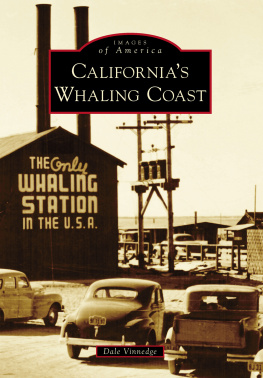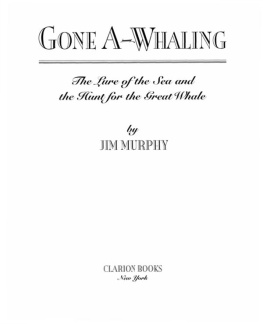Spirits of Our Whaling Ancestors
Whaler photograph by Edward S. Curtis; Courtesy Royal British Columbia Museum, Victoria.
SPIRITS OF OUR WHALING ANCESTORS
Revitalizing Makah and Nuu-chah-nulth Traditions
CHARLOTTE COT
Foreword by MICAH McCARTY
THE CAPELL FAMILY ENDOWED BOOK FUND supports the publication of books that deepen the understanding of social justice through historical, cultural, and environmental studies. Preference is given to books about the American West and to outstanding first books in order to foster scholarly careers.
2010 by the University of Washington Press
Printed in the United States of America
Design by Thomas Eykemans
15 14 13 125 4 3 2
All rights reserved. No part of this publication may be reproduced or transmitted in any form or by any means, electronic or mechanical, including photocopy, recording, or any information storage or retrieval system, without permission in writing from the publisher.
Published in the United States of America by
UNIVERSITY OF WASHINGTON PRESS
P.O. Box 50096, Seattle, WA 98145 U.S.A.
www.washington.edu/uwpress
Published in Canada by
UBC PRESS
University of British Columbia
2029 West Mall, Vancouver, B.C. V6T 1Z2
www.ubcpress.ca
Library of Congress Cataloging-in-Publication Data and Library and Archives Canada Cataloging in Publication can be found at the end of the book.
The paper used in this publication is acid-free and 90 percent recycled from at least 50 percent post-consumer waste. It meets the minimum requirements of American National Standard for Information SciencesPermanence of Paper for Printed Library Materials, ANSI Z39.481984.
This book is dedicated to my mother, the late Evelyn Georg,
whose love nurtured me, whose wisdom guided me,
whose knowledge of our language and culture educated
and enlightened me, and whose spirit continues to support
and nourish me through lifes journey.
Foreword
IN THIS VERY RELEVANT STUDY OF MAKAH AND NUU-CHAH-NULTH whaling traditions and practices, the reader is afforded an inside perspective on modern aboriginal self-determination from the point of view of a Native scholar.
The Native drive to sustain the ancient traditions of whaling is forced to adapt to the pressures of Western civilization, an experience that can make for a two-world sense of identity. The realities of the Native homeland and those of the outside world are often an ocean apart; most people are far from their ancestral homes and disconnected from a natural experience of an organic environment. On the other hand, there is a place we Natives call home, where we understand one another better then most mainstreamers will ever know and where we return throughout our lives. We are taught from a place-based perspective, with a multigenerational, long-term observation of the world that provides the means by which we define ourselves. Charlotte Cot will introduce you to a West Coasters place in the world heritage.
As a Makah who steadfastly values what it means to know who you are and where you come from, I find this book to be a proud affirmation of family history and a sense of belonging, demonstrating a thread that connects and a chord that resonates with Makah and Nuu-chah-nulth, regardless of the legal divisions of colonial borders. Dr. Cot makes an important contribution to indigenous scholarly resources, a contribution from the heart of the West Coast. Because she herself was active in the movement to revitalize Makah whaling, she sees the need for a two-pronged campaign: one that is a culturally grounded education of our people, by our people, for our people, and one that is steeped in the diplomacy of educating peoples of the outside world. She takes the reader along on a canoe journey to explore both approaches, so that the Native and the non-Native worlds can better understand each other. This canoe journey is a fitting metaphor for cultural sensitivity in light of the recent United Nations Declaration of Indigenous Rights. Only four member nations voted against the Declaration New Zealand, Australia, Canada, and the United States of Americawhich is an interesting fact about English-speaking colonialism.
Dr. Cot introduces the reader to our people and provides identifying elements of our history, and then her canoe takes us to the heart of an emotionally charged debate on the philosophical differences between Native beliefs and those founded in the animal rights movement. She assertively confronts the school of thought that animals, and especially whales, are not for human consumption. She exposes a New Age dogma that is both pious and inflexible, a dogma that may well be a product of the corporate Save the Whales culture, in which the financial sustainability of a nongovernmental organization (ngo) can compromise its ethics and may have spawned another brand of supremacist with another style of ethnic cleansing.
This book is profoundly important to the advancement of a better understanding of cultural diversity. It is also a must-read for Native students and scholars. Dr. Cot takes a proud stand on a controversial issue; she sheds light on our sacred traditions and helps safeguard their endurance.
MICAH MCCARTY
Vice-Chair, Makah Tribal Council
April 2010
Kleko Kleko/Thank You
THIS BOOK WOULD NOT HAVE BEEN POSSIBLE WITHOUT THE LOVE, support, and encouragement of my beautiful family, my Tseshaht community, my hawiih, and my entire Nuu-chah-nulth Nation. It was their words, stories, and teachings, their strength and honesty, that guided my hands as I wrote the book. They encouraged me to pursue my scholastic dreams, but at the same time to stay always rooted in my culture and community. They have all given me so much in my life and made me the proud Tseshaht woman I am today. My deep appreciation also goes to the many Makah people whose wisdom threads throughout these pages. To all, kleko kleko! I hope with this book to humbly give something back.
To my parents, Jack and the late Evelyn Georg, kleko kleko for their unconditional love and support and for encouraging me to thlulh silh a, to do something good with my life. My mothers spirit is always with me, and knowing this keeps me going. I will hold her in my heart forever. Kleko kleko to my late grandparents, Hughie and Grace Watts, for their wonderful teachings and beautiful stories. Kleko kleko to my late brother-in-law, Art Thompson, and my sister, Charlene Thompson-Reid, for opening their home and their hearts to me. I will forever carry with me the utmost respect for and gratitude to Art, who was always available to share his knowledge and his amazing and insightful whaling stories, which were filled with passion and sincerity.
A special kleko kleko to my friend Makah Tribal Council vice-chair Micah McCarty. In the many conversations we had over the years, Micah demonstrated to me how important the whaling tradition was and still is to the Makah people. His passion for his culture, his whaling identity, and his devotion to community continue to empower me. I am grateful to him for graciously sharing family whaling stories and his knowledge of Makah history. Throughout this process, Micah has become a dear friend.





